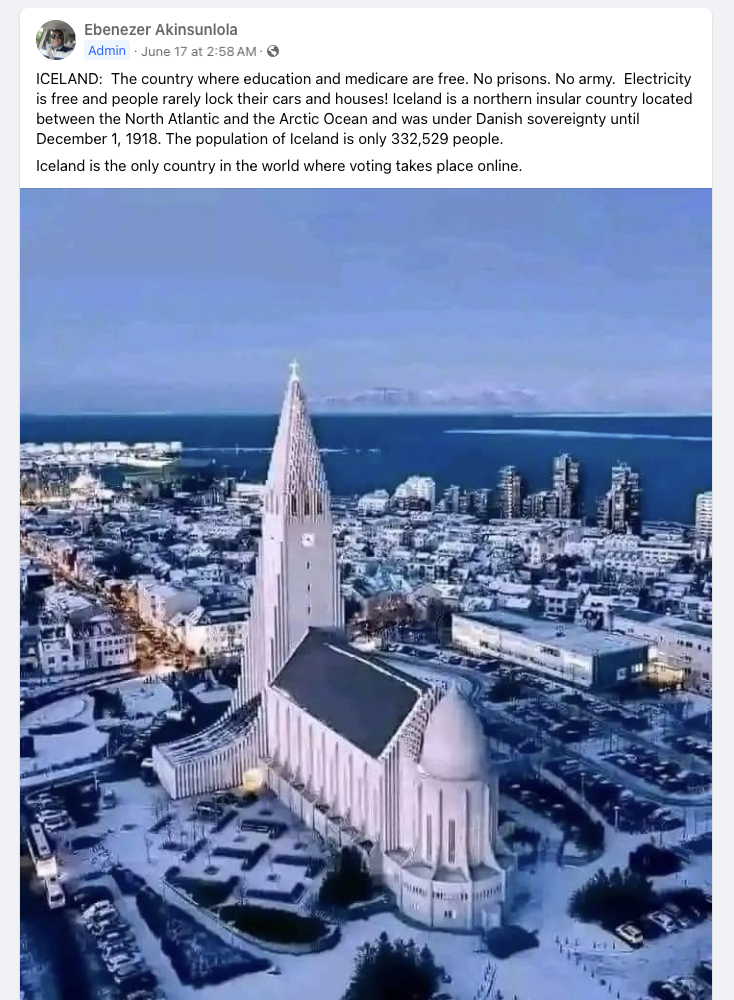
Does Iceland have "no prisons" and is electricity free there? No, that's not true: Iceland does have four correctional facilities. A typical monthly residential electricity bill there ranges between $16.50 and $43.
The claim appeared in a post (archived here) on Facebook on June 17, 2024. It opened:
ICELAND: The country where education and medicare are free. No prisons. No army. Electricity is free...
This is what the post looked like on Facebook at the time of writing:
(Source: Facebook screenshot taken on Wed Jun 26 14:39:43 2024 UTC)
Iceland, an island country of roughly 364,000 people in the northern part of the Atlantic Ocean, is considered a high-income economy (archived here). While it offers a number of social benefits to its residents, that does not extend to free-of-charge energy for everyone or total eradication of crime resulting in the closure of all prisons.
Prisons in Iceland
Francis Pakes (archived here), a professor of criminology at the U.K.'s University of Portsmouth, who once checked himself in Iceland's prisons for research purposes (archived here), told Lead Stories via email on June 26, 2024:
... prisons clearly exist, are used and are internationally recognised.
Sometimes people wish to portray Nordic societies as peaceful and crime free, but they are not crime free and prisons fulfil an essential function in Iceland.
Iceland's electricity market
The structure of Iceland's electricity market, historically not integrated into neighboring power systems, is different from that of the United States.
Almost 100 percent of electricity in Iceland (archived here) comes from renewable sources.
Furthermore, the role of privately owned entities is significantly smaller. A 2020 report produced by Fraunhofer (archived here), which is one of the major German-based applied research organizations, for Iceland's Department of Energy reads (at the bottom of page 9):
In Iceland, most of the power companies are in public ownership. The National Power Company Landsvirkjun (state owned) holds the highest power generation share (71 %), followed by Reykjavik Energy ON (19 %). HS Orka, as a partly-public owned power company, contributes around 7 % to the electricity generation ...
There are five distribution system operators and only one (HS Veitur) of them is not in fully public ownership.
None of that, however, implies that monthly electricity bills don't exist, said Director of Iceland School of Energy Juliet Ann Newson (archived here) in an email to Lead Stories received on June 26, 2024:
Electricity in Iceland is relatively cheap but not free!
The Fraunhofer report cited above details different components such as fees and discounts that shape the cost of electricity in Iceland. Page 18 lists a figure of $25.70 per megawatt-hour as the 2019 national average.
To put that into perspective, as the Reykjavík-based energy company ON Power (archived here) estimates, a household of two persons spends an equivalent of roughly $16.50 per month on electricity while bills for larger households of up to six people may go as high as approximately $43.
That is consistent with the electricity cost seen in a 2023 Statista report (archived here).
Lead Stories reached out to Iceland's Prison and Probation Administration and Energy agencies for additional comments. If we get a response, this story will be updated as appropriate.
A series of posts containing similar claims were previously reviewed by the Dispatch.
Other Lead Stories fact checks about international stories can be found here.


















